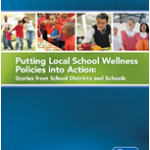Local School Wellness Policy
A local school wellness policy (wellness policy) is a written document that guides a local educational agency (LEA) or school district’s efforts to create supportive school nutrition and physical activity environments. This is important because each local education agency participating in federal Child Nutrition Programs, including the National School Lunch Program or the School Breakfast Program , is required to develop and implement a wellness policy.
Creating a Wellness Policy
Wellness policies can be integrated into the Whole School, Whole Community, Whole Child (WSCC) model for school health, and can address policies and practices for before-, during-, and after-school.
 Wellness Policies Into Action Cover" />
Wellness Policies Into Action Cover" />
Putting Local School Wellness Policies into Action: Stories from School Districts and Schools [PDF – 2 MB] is a compilation of 11 stories that provide examples of steps and strategies used to implement wellness policies, including activities in key areas such as improving school meals and increasing physical activity levels among students.
Local School Wellness Policy Requirements List
School districts can develop wellness policies to meet the unique needs of each school under its jurisdiction, but at a minimum are required to:
- Include goals for nutrition promotion and education, physical activity, and other school-based activities that promote students wellness. In developing these goals, local educational agencies must review and consider evidence-based strategies.
- Include nutrition guidelines for all foods sold on each school campus during the school day that are consistent with federal regulations for school meals and Smart Snacks in School nutrition standards .
- Include policies for foods and beverages made available to students (e.g., in classroom parties, classroom snacks brought by parents, other foods given as incentives).
- Include policies for food and beverage marketing that allow marketing and advertising of only those foods and beverages that meet the Smart Snacks in School nutrition standards .
- Permit parents, students, representatives of the school food authority, teachers of physical education, school health professionals, the school board, school administrators, and the general public to participate in the development, implementation, and update of the local school wellness policy.
- Identify one or more school districts or school officials who have the authority and responsibility to ensure each school complies with the policy.
- Inform and update the public (including parents, students, and others in the community) about the local school wellness policy on an annual basis.
- At least once every 3 years, measure how schools are in compliance with the local school wellness policy, the extent to which the local education agency’s local wellness policy compares to model local school wellness policies, and the progress made in attaining the goals of the local wellness policy. Make the assessment available to the public.
- USDA Team Nutrition Local School Wellness Policy
Overview of required local wellness policy requirements.
- USDA Local School Wellness Policy Implementation Tools and Resources
- WellSAT 3.0: Wellness School Assessment Tool
Tool to assess the comprehensiveness and strength of school wellness policies.
- Alliance for a Healthier Generation Model Local School Wellness Policy
The Alliance for a Healthier Generation’s Model Local School Wellness Policy provides language for creating USDA compliant policies and offers additional guidance for developing more robust wellness policies that integrate all the areas of the WSCC model.
- Alliance for a Healthier Generation Wellness Policy Resources
Resources for schools and school districts to create sustainable healthy school environments.
- Bridging the Gap (BTG) Research on District Wellness Policies
Research products related to BTG’s annual collection and coding of school district wellness policies.
- Nutrition and Obesity Policy Research and Evaluation Network (NOPREN) School Wellness Working Group
Working group or researchers and practitioners who focus on policies and strategies to improve school wellness.

 Wellness Policies Into Action Cover" />
Wellness Policies Into Action Cover" /> Wellness Policies Into Action Cover" />
Wellness Policies Into Action Cover" />